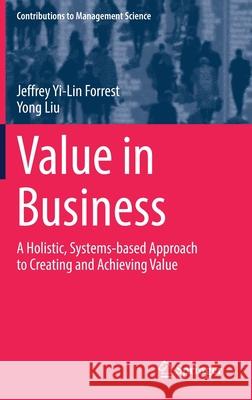Value in Business: A Holistic, Systems-Based Approach to Creating and Achieving Value » książka
topmenu
Value in Business: A Holistic, Systems-Based Approach to Creating and Achieving Value
ISBN-13: 9783030828974 / Angielski / Twarda / 2021 / 536 str.
Kategorie:
Kategorie BISAC:
Wydawca:
Springer
Seria wydawnicza:
Język:
Angielski
ISBN-13:
9783030828974
Rok wydania:
2021
Wydanie:
2021
Numer serii:
000451748
Ilość stron:
536
Waga:
0.91 kg
Wymiary:
23.39 x 15.6 x 3.02
Oprawa:
Twarda
Wolumenów:
01
Dodatkowe informacje:
Wydanie ilustrowane











